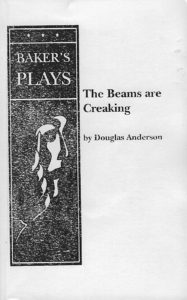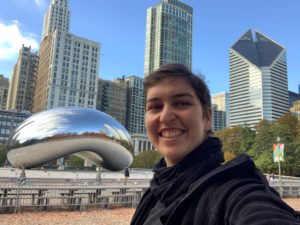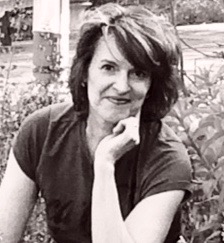How does one portray the life of a man whose ultimate fate was a hanging at the hands of the Gestapo, with just four weeks left until the German surrender in World War II? Even an experienced professional actor might find that role daunting. I played that role last Friday evening in what amounted to my amateur acting debut, complicated by a Zoom platform in what we all hope are the latter stages of a pandemic. I’m certainly accustomed to being on a stage in front of an audience as a public speaker, but in those situations, I am speaking for myself. Portraying a historical figure of the magnitude of Dietrich Bonhoeffer is a very different matter.
The collective performance of volunteers mostly from Augustana Lutheran Church of Hyde Park in Chicago occurred on the anniversary of Bonhoeffer’s execution in 1945, at the Flossenburg concentration camp near the German border with Czechosolvakia. One suspects the SS, whose Judge Otto Thorbeck condemned him to die the day before the hanging, must have been in a hurry. Just two weeks later, American troops liberated the camp.
My intent in discussing this in a blog post is not to review the play, The Beams Are Creaking, by Douglas Anderson, but to reflect on what I learned from taking on this role in the first place. It is also the case that several rehearsals—and rereading the script a few times—occupied enough of my time to explain my hiatus from blog writing in recent weeks. It was only as we practiced our parts that I began to realize what I was trying to accomplish, but I was hooked. The play begins in 1933, with Bonhoeffer returning from the United States to Germany at the dawn of the Nazi rise to power. There are several biographies of Bonhoeffer, the most notable probably being that written by his close associate, Eberhard Bethge, Dietrich Bonhoeffer: A Biography, originally published in Germany in 1967, and later translated into English.
The necessary brevity of a play, if done well (and this is), condenses essential points and makes them more visible not only to the audience, but to the actors as well. I quickly realized from the full scope of the script that Bonhoeffer was not entirely the same man in 1945 that he was at the outset of the drama, when a streak of naivete about the German future still shaped his outlook. Born in 1906 in what is now Poland, Bonhoeffer returned from America with decided impressions about the injustice perpetrated on the American Negro, but not disposed to compare their situation with the plight of Jews in Germany, in part because he simply did not believe that Germany could succumb to the appeal of Adolf Hitler. Confronted early in the first act by Hans von Dohnanyi with the possibility of the Nazis gaining power, Bonhoeffer simply replies, “It couldn’t happen. It couldn’t happen in Germany.” By now, of course, the most observant among us are aware of a few too many historical developments that “could not happen” but did.
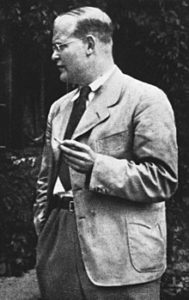
Photo of Dietrich Bonhoeffer, reproduced from Wikipedia at https://en.wikipedia.org/wiki/Dietrich_Bonhoeffer
Bonhoeffer was soon disabused of his initial perspective, particularly when he dares to give a radio speech implicitly criticizing the Fuhrer. The Nazis silenced the radio station before he could finish. And that is the first of many steps that lead him steadily, inexorably, into a conspiracy to assassinate Hitler—a conspiracy that failed with dire consequences for those involved. When the play ends, he is sitting in Tegel prison, but Gestapo agents have come to transfer him to Flossenburg, which all around him know to be a death sentence.
The challenge for me in playing Bonhoeffer was to transfer to a Zoom screen that sense of the gradual but inevitable shift from a 27-year-old idealist, steeped in faith as a trained theologian and pastor, to a 39-year-old man who has come to terms with the deepest meaning of faith at the darkest moments in anyone’s life.
This struggle for almost anyone involves a powerful mixture of personal circumstances and challenges and some sort of deep faith that undergirds the transition that his life undergoes. One key turning point, midway through the play, involves the planned emigration of his sister, Sabine, and her Jewish husband Gerhard, to escape the coming Holocaust. In the play, this is the point when, having been approached by others who are involved in the plot against Hitler, he decides, “I will be a conspirator.” This is not a line that I shouted from the rooftop; it was one that I delivered with a heavy heart, realizing what will likely be demanded of Bonhoeffer in the coming years.
The second and final act opens later with Bonhoeffer in prison, chatting with a friendly guard, musing over his role as a thorn in the side of the Gestapo. The middle of the act consists of a monologue, Bonhoeffer with a mop talking to the floor, articulating his frustration with the official church in Germany, its betrayal of principles and purpose, ultimately concluding that it has driven the thinking man from the church because, “It honesty doesn’t know what to say to him.” One might call it a sense of despair, but it is also a lonely note of defiance.
One cannot gainsay the role of faith in Bonhoeffer’s life and how it affected his decisions. For a 39-year-old man facing death, he left behind some of the most meaningful spiritual writings of the 20th century, including his letters from prison, but also the classic The Cost of Discipleship, which begins with the theologically famous line, “Cheap grace is the mortal enemy of our church. Our struggle today is for costly grace.” Bonhoeffer was not about to lie to anyone about the high cost of confronting evil power.
That is the background. What did I learn from this volunteer dramatic effort? First, there was the challenge of presenting this on Zoom, as pandemic restrictions made a live stage presentation problematic. We practiced on Zoom, which was never designed for presenting plays, and learned to work with its limitations. These included the need for all of us to wait at strategic points to deliver our lines until Nancy Goede, pastor of Augustana, who conceived of this operation in the first place, secured the licensing rights to present it, and acquired the scripts for all of us, could produce sound effects (such as knocking on a door or a phone ringing) at points where that otherwise would have been a background stage noise. On Zoom, however, our talking would have filtered out such sounds, so we had to master the timing to allow those sounds to occur. There are scenes where the historical context emerges from radio announcements, and certain people had to provide those, speaking into makeshift microphones of the era, and so forth. In many ways, despite the visual presence on Zoom, our production resembled an old theater of the radio, and with a story set in the 1930s and 1940s, perhaps that aided the dramatic impact. But taking all the emotional impact of the story I mention above, and framing it within Zoom, was an interesting challenge and ate up a significant amount of time in rehearsals.
Given that almost no one had the spare time to learn every line by heart, this was “Readers Theater,” in which people used the script during the performance. However, to increase the impact of Bonhoeffer’s presence, I mastered the art of essentially hiding the script below the screen, that is, out of sight of the webcam, while also anticipating lines that I could deliver without even looking at it. On stage, all of this would have been impossible, but then Zoom made other things impossible, such as Bonhoeffer hugging or kissing his fiancée, Maria von Wedemeyer, when she visits him in prison. Live theater online involves its own fair share of compromises.
I would love to provide some photos here of the performance, but licensing rights prohibited recording. I have chosen to make do with other approaches to make this more visually interesting.
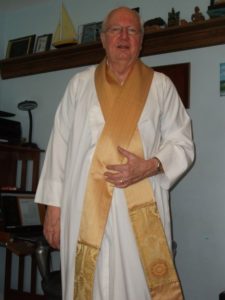
Me, as Bonhoeffer, in “studio” in clerical garb for scene with Hermann Goering and Bishop Ludwig Muller
In addition to the invisible but important influence of people like the pastor, I must mention that no performance like this operates without serious teamwork. Much of what I did gained from the adroit counterplay of other actors. Dan Friedrich, who played multiple roles, was a remarkably cynical Hermann Goering, making very effective use of Goering’s perverse sense of humor, as in a meeting between himself, Bonhoeffer, and Bishop Muller of the German national church. When Bonhoeffer offers to show that his opposition movement has some 6,000 pastors objecting to some new Nazi policy declarations, Goering laughs it off by noting ominously that “we already know who they are.” Both my role and Dan’s demanded an effective foil on the other side. I learned how to use such foils to the benefit of the portrayal of my own character. On
the other hand, Theresa Fuchs, a visitor from Germany working at the Goethe-Institut, played a very convincing and sincere Maria. Her soft German-accented English lent an air of linguistic reality to the play, but more importantly, she also schooled the rest of the cast on the proper pronunciation of German names (though it didn’t always take, as one might expect).
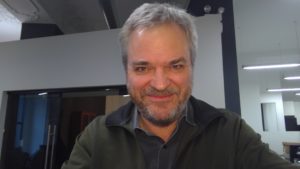
Dan Friedrich played both sides: General Hermann Goering and the anti-Nazi conspirator Schlabrendorff. That is, when not also playing an American correspondent at the 1936 Berlin Olympics.
As for Dan, a software developer who has a serious sideline hobby in comedy improv, he can take credit for introducing us to Andrea Holliday, who provided the narration where Zoom made certain stage effects either difficult or impossible.
In the end, this experience taught me a deeper respect than I already had for what professional and even community theater actors attempt to do all the time. It involves investing some of your own emotional energy in the portrayal of the character, and in the case of a character like Bonhoeffer, some significant willingness to try to achieve an understanding of that person’s world view and faith. Frankly, after this 2 ½-hour online presentation was over, I felt a significant need to unwind and recover from what I had just done. Acting is a unique artistic enterprise in the way it demands that you embrace another person’s perspective, especially when that person is a historic figure, rather than the product of a creative author’s mind. It stretches one’s mind and heart in special ways.
Jim Schwab
P.S.: For a blog perspective on the presentation by Pastor Nancy Goede’s husband, Jim Vondracek, click here.

